In the more than 45 years since the Middle East war of June 1967, there have been many peace plans and many negotiations.
Some of these have been successful, including those between Egypt and Israel and Israel and Jordan, but a settlement has still not been reached in the core conflict - the dispute between the Israelis and Palestinians.
Here are the main peace proposals since 1967 and what happened to them.
UN Security Council Resolution 242, 1967
Resolution 242 was passed on 22 November 1967 and embodies the principle that has guided most of the subsequent peace plans - the exchange of land for peace.
The resolution called for the "withdrawal of Israeli armed forces from territories occupied in the recent conflict", and "respect for and acknowledgement of the sovereignty, territorial integrity and political independence of every state in the area and their right to live in peace within secure and recognised boundaries free from threats or acts of force".
The resolution is famous for the imprecision, in English, of its central phase concerning an Israeli withdrawal - it says simply "from territories". The Israelis said this did not necessarily mean all territories, but Arab negotiators argued that it did.
It was written under Chapter VI of the UN Charter, under which Security Council resolutions are recommendations, not under Chapter VII, which means they are orders. Many peace proposals refer to 242. Resolution 338 is usually linked to it. This called for a ceasefire in the war of October 1973 and urged the implementation of 242 "in all its parts".
Camp David Accords, 1978
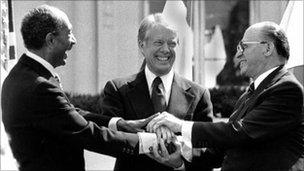
There were several peace plans following the 1967 war, but nothing happened until after the 1973 Yom Kippur or October War. There followed a new mood for peace, as shown by a historic visit to Jerusalem by the Egyptian President, Anwar Sadat, in November 1977.
US President Jimmy Carter capitalised on the new mood and invited President Sadat and the Israeli Prime Minister, Menachem Begin, for talks at the presidential retreat at Camp David near Washington. The talks lasted for 12 days and resulted in two agreements.
The first was called A Framework for Peace in the Middle East. It laid down principles for peace, expanding on resolution 242, set out what it hoped was a way of resolving what it called the "Palestinian problem", agreed that there should be a treaty between Egypt and Israel and called for other treaties between Israel and its neighbours. The weakness of the first agreement was the section on the Palestinians. The plan aimed to set up a "self-governing authority" in the West Bank and Gaza, leading to eventual "final status" talks, but the Palestinians were not party to the agreement.
The second accord was the The Camp David framework for the peace treaty between Egypt and Israel. This followed in 1979, after an Israeli withdrawal from the Sinai. This was the first recognition of Israel as a state by a major Arab country. The talks probably stand as the most successful negotiations in the whole peace process. The treaty has lasted, and it substantially strengthened Israel's position. However the peace between Egypt and Israel has not been warm. President Sadat was himself later assassinated.
The Madrid Conference, 1991
This conference, co-sponsored by the US and the Soviet Union, was designed to follow up the Egypt-Israel treaty by encouraging other Arab countries to sign their own agreements with Israel.
Jordan, Lebanon and Syria were invited as well as Israel and Egypt. The Palestinians were also represented, but as part of a joint delegation with Jordan and not by Yasser Arafat or other leading figures in the Palestine Liberation Organisation (PLO), to whom the Israelis objected.
The conference eventually led to a peace treaty between Israel and Jordan in 1994, but correspondents say this probably would have happened anyway. Israeli talks with Syria and Lebanon took place after Madrid but have since stalled, complicated by border disputes and, more recently, the 2006 war between Israel and Lebanese Hezbollah militants.
The Palestinian track soon gave way to secret talks that led to the Oslo agreement.
Oslo Agreement, 1993
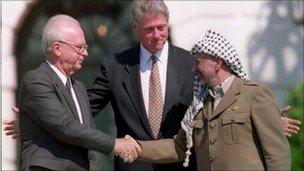
The Oslo negotiations tried to tackle the missing element of all previous talks - a direct agreement between Israelis and Palestinians, represented by the PLO. Its importance was that there was finally mutual recognition between Israel and the PLO.
The talks took place in secret under Norwegian auspices and the agreement was signed on the White House lawn on 13 September 1993, witnessed by President Bill Clinton. The PLO leader, Yasser Arafat, and the Israeli Prime Minister, Yitzhak Rabin, shook hands.
The Oslo Agreement stipulated that Israeli troops would withdraw in stages from the West Bank and Gaza, that a "Palestinian Interim Self-Governing Authority" would be set up for a five-year transitional period, leading to a permanent settlement based on resolutions 242 and 338.
The agreement spoke of putting "an end to decades of confrontation and conflict" and of each side recognising "their mutual legitimate and political rights".
Therefore, though not stated explicitly in the text, the implication was that a state of Palestine would one day be set up alongside Israel.
There was an exchange of letters in which Yasser Arafat stated: "The PLO recognises the right of the State of Israel to exist in peace and security." Yitzhak Rabin said: "The Government of Israel has decided to recognise the PLO as the representative of the Palestinian people."
Hamas and other Palestinian rejectionist groups did not accept Oslo and launched suicide bomb attacks on Israelis. There was opposition within Israel from settler-led groups. Oslo was only partially implemented.
Camp David, 2000
Various attempts were made (including at Taba in 1995, Wye River in 1998 and Sharm el-Sheikh in 1999) to speed up the withdrawal and self-government provisions of Oslo. Then in 2000, President Bill Clinton sought to address the final status issues - including borders, Jerusalem and refugees - that Oslo had left aside for later negotiation.

The talks took place in July between Israeli Prime Minister Ehud Barak and PLO Chairman Yasser Arafat. There was no agreement. However, the negotiations were more detailed than ever before. Correspondents say the basic problem was that the maximum Israel offered was less than the minimum the Palestinians could accept.
Israel offered the Gaza Strip, a large part of the West Bank, plus extra land from the Negev desert, while keeping major settlement blocks and most of East Jerusalem. It proposed Islamic guardianship of key sites in the Old City of Jerusalem and contributions to a fund for Palestinian refugees.
The Palestinians wanted to start with a reversion to the lines of 1967, offered the Israelis rights over the Jewish quarter of the Old City and wanted recognition of the "right of return" of Palestinian refugees.
The failure at Camp David was followed by a renewal of the Palestinian uprising or intifada.
Taba, 2001
Although he was about to leave office, Bill Clinton refused to give up and presented a "bridging proposal" which set up further talks in Washington and Cairo and then Taba in Egypt. These talks were not at the top level, but differences were narrowed without being overcome. There was more flexibility on territory and it was reported by EU observers that Israeli negotiators accepted the concept of East Jerusalem being the capital of a Palestinian state.
A statement afterwards said that "it proved impossible to reach understandings on all issues". The Israeli Prime Minister, Ehud Barak, fighting an election campaign, said that "nothing is agreed upon until everything is agreed upon". He said that he could not commit a subsequent government to what he called the "ideas" coming out of the talks. With the election of Ariel Sharon in February 2001, time ran out.
Arab Peace Initiative, 2002
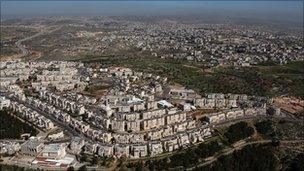
After the failure of bilateral talks and the resumption of conflict, the Saudi peace plan presented at an Arab summit in Beirut in March 2002 went back to a multi-lateral approach and in particular signalled a desire by the Arab world as a whole to put an end to this dispute.
Under the plan, called the Arab Peace Initiative, Israel would withdraw to the lines of June 1967, a Palestinian state would be set up in the West Bank and Gaza and there would be a "just solution" of the refugee issue. In return, Arab countries would recognise Israel. The plan was re-endorsed by another Arab summit in Riyadh in 2007.
Its strength is the support given by Arab countries to a two-state solution. Its weakness is that the parties have to negotiate the same issues on which they have failed so far.
Roadmap, 2003
The roadmap is a plan drawn up by the "Quartet" - the United States, Russia, the European Union and the United Nations. It does not lay down the details of a final settlement, but suggests how a settlement might be approached. It followed efforts made by US Senator George Mitchell to get the peace process back on track in 2001.
The plan was preceded by an important statement in June 2002 by President George W Bush who became the first US president to call for a Palestinian state. It proposed a phased timetable, putting the establishment of security before a final settlement. It is designed to create confidence, leading to final status talks.
- Phase 1: Both sides would issue statements supporting the two-state solution, the Palestinians would end violence, act against "all those engaged in terror", draw up a constitution, hold elections and the Israelis would stop settlement activities and act with military restraint
- Phase 2: Would see the creation, at an international conference, of a Palestinian state with "provisional borders"
- Phase 3: Final agreement talks
The road map has not been implemented. Its timetable called for the final agreement to be reached in 2005. It has largely been overtaken by events, but remains a reference point for negotiations.
Geneva Accord, 2003
While official efforts foundered, an informal agreement was announced in December 2003 by Israeli and Palestinian figures - Yossi Beilin, one of the architects of Oslo, on the Israeli side, and former Palestinian Information Minister Yasser Abed Rabbo on the other.
The Geneva Accord reverses the concept of the roadmap, in which the growth of security and confidence precede a political agreement, and puts the agreement first, which is then designed to produce security and peace.
Its main compromise is that the Palestinians effectively give up their "right of return" in exchange for almost the whole of the West Bank, though there could be a token return by a few. Israel would give up some major settlements such as Ariel, but keep others closer to the border, with swaps of land in Israel for any taken in the West Bank. Palestinians would have the right to have their capital in East Jerusalem, though with Israeli sovereignty over the Western Wall in the Old City.
Another unofficial agreement was one drawn up by a former head of the Israeli Shin Bet internal security service, Ami Ayalon, and a former PLO representative in Jerusalem, Sari Nusseibeh. This envisaged a return to the 1967 lines, an open city of Jerusalem and an end to the Palestinian claim to a right of return to former homes.
Annapolis, 2007
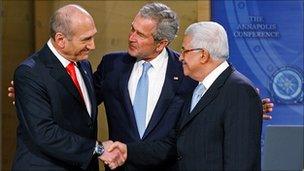
Late in his second presidential term, US President George W Bush hosted a conference at the US Naval Academy at Annapolis, Maryland aimed at relaunching the peace process.
Israeli Prime Minister Ehud Olmert and Palestinian Authority President Mahmoud Abbas took part in talks along with officials from the peace-making Quartet and more than a dozen Arab countries, including Saudi Arabia and Syria. This was seen as significant as they do not officially recognise Israel.
However the Palestinian group Hamas, which had won parliamentary elections and taken control of the Gaza Strip, was not represented. It declared it would not be bound by anything decided.
A joint understanding was issued by the Israeli and Palestinian leaders to engage in negotiations with the goal of a full peace deal by the end of 2008. They agreed that implementation would wait until confidence-building measures outlined in the "Roadmap" had been met.
Regular meetings took place between Mr Olmert and Mr Abbas, during which their teams exchanged maps of possible border solutions, but failed to reach agreement. Mr Olmert said his offer was the most generous ever made to the Palestinians - international supervision of Jerusalem's holy sites, the symbolic return of a few thousand Palestinian refugees and reportedly Israeli withdrawal from 93.7% of the West Bank, plus the equivalent of 5.8% of its area from Israel in a land swap. Mr Abbas's team said it produced a map which offered to let the Israelis keep 1.9% of the West Bank in exchange for land in Israel.
The talks came to an abrupt halt with Israel's military offensive in Gaza in December 2008. This coincided roughly with the end of Mr Olmert's time in office and his replacement by Benjamin Netanyahu, who took several months even to back publicly the concept of a Palestinian state.
Washington, 2010
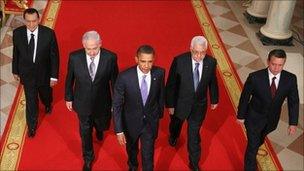
After taking office, US President Barack Obama was quick to try to restart the peace process. Contact between Israel and the Palestinians resumed in May 2009, after a hiatus of 19 months, in the form of indirect "proximity talks" through US Middle East envoy George Mitchell.
In November 2009, Mr Obama persuaded Mr Netanyahu to agree to a 10-month partial freeze on settlement construction in the West Bank, which the Israeli leader hailed as "the first meaningful step towards peace". But Mr Abbas said it did not cover East Jerusalem and that he wanted a guarantee of a Palestinian state based on 1967 lines.
After months of hard diplomacy, US Secretary of State Hillary Clinton announced that Mr Netanyahu and Mr Abbas had agreed to "re-launch direct negotiations to resolve all final status issues" and that they believed the talks could "be completed within one year".
The talks, also attended by President Hosni Mubarak of Egypt and King Abdullah of Jordan, began in Washington on 2 September 2010. Expectations were low and deadlock was reached within weeks.
The Israeli and Palestinian leaders met just once more, at Sharm el-Sheikh, before Israel's settlement construction freeze expired on 26 September and the talks were suspended. US negotiators subsequently failed to persuade Mr Netanyahu's coalition government to renew the moratorium, or to convince Mr Abbas to resume negotiations without an end to all settlement activities on occupied territory.






